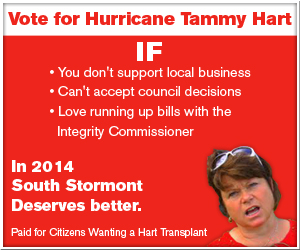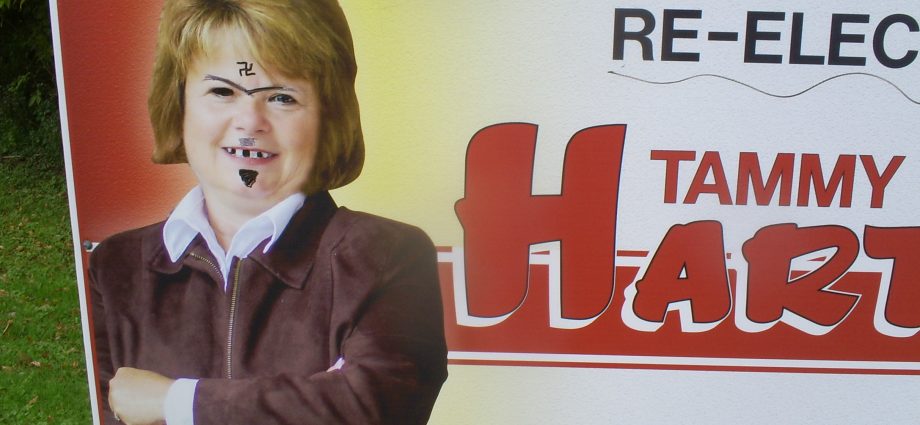 CFN – I had a chance to finally catch up with South Stormont Mayor Bryan McGillis who is running for a third term. He shared on how in all his years in politics he’s never seen such a dirty election which has included theft of his and other candidates signs.
CFN – I had a chance to finally catch up with South Stormont Mayor Bryan McGillis who is running for a third term. He shared on how in all his years in politics he’s never seen such a dirty election which has included theft of his and other candidates signs.
But what’s most disturbing to him are the phone calls he’s received from constituents over misinformation and straight out lies being shared.
Also some of the promises such as Jim Bancroft promising to pave all the roads in South Stormont that haven’t been paved which is somthing that Bancroft certainly didn’t do while mayor or serving in office. The ploy was a copy of the one that Eric Duncan pled in North Dundas when he ran for election; but where is the cash supposed to come from to pay for that paving? How many roads did Duncan have paved in the last four years?
The biggest issue was candidate Rick Currier portraying debentures for debt which is something done by municipalities as a norm and are not the same as borrowing for projects like arenas.
Bancroft has still not answered into his role and how much the township was burdened by after the Osnabruck Centre Salt Shed scandal where he was the Insurance Broker for the Township and Mayor in a situation that resulted in taxpayers losing major cash after settling for a $66K settlement against former Mayor Bancroft and the insurance companies.
Voters make their decision on Monday October 27th.

(Comments and opinions of Editorials, Letters to the Editor, and comments from readers are purely their own and don’t necessarily reflect those of the owners of this site, their staff, or sponsors.)
Comment policy reminder
CFN suggests you post comments using your real name. If you wish to post with a pseudonym you can register that user id by emailing info@cornwallfreenews.com with your name, address, phone number and user id you wish to register.

And they say Cornwall politics is dirty!!
The upheaval in South Stormont began after City of Cornwall rejected the bio-pellet plant . . . and an elected official enticed the bio-pellet promoter to consider setting up shop in South Stormont, courtesy of the promise of government funding. Cornwall had previously endured a long and unproductive involvement with companies that depended on government funding . . . one example being the proposed ethanol plant that dragged on-and-on-and-on for many years, the result of too much political involvement. The bio-pellet plant proposal for South Stormont was the result of the former McGuinty government’s misguided romance with renewable energy . . . including stripping municipal governments of their power to stop renewable energy projects such as solar and wind power from being developed right within municipal boundaries.
Residents of South Dundas revolted against new wind farms while South Stormont and South Glengarry literally had solar PV farms rammed up their rear ends . . . and 2 x potential industrial sites at Ingleside were prime locations for solar farms. Without the McGuinty government providing funding for wind, solar, ethanol and bio-pellets, much of the political nastiness that happened in South Stormont may have been avoided altogether.
The McGuinty government had proposed to convert coal-fired power stations to burning bio-pellets, as has happened at Atikokan power station near Thunder Bay . . . it generates about 10% of the output of the Canadian side of Moses Saunders power dam. Nanticoke power station in Southern Ontatio has been closed.
Greenfield Ethanol opened their plant at Johnstown . . . and resolved a long, nasty and awful that had dragged on for many years at Cornwall. While bio-pellet plant nastiness was under way at South Stormont, a bio-pellet company announced plans to open a plant at Johnstown . . . a proposal that would have ended bio-pellet plant discussions in South Stormont.
Problem at Johnstown is that the Port of Johnstown is too small to handle the volume of corn, grain and other bulk that passes through that port. Then plans were announced to build a river port between Morrisburg and Iroquois, to handle grain shipments from Eastern Ontario . . . . except that area residents rebelled against the port proposal.
The only cost-competitive way to move massive volumes of bio-pellets out of the region is to use river transport. Canada Starch (CASCO) has their own private port at Cardinal . . . and they periodically produce bio-pellets for export . . . . and those bio-pellets leave on river transport.
If Bryan McGillis is re-elected, I would urge him to turn over the bio-pellet file to SD&G’s economic development officer, who would periodically update council re progress. Such a transfer would keep a future South Stormont council peaceful.
I have previously written about the potential of South Stormont’s newly designated industrial area located between Hwy 401 and the CN Rail line, east of Moulinette Road. That area is located very close to the power dam . . and has a power transmission line passing through it. If the Wynne government were to charge customers for transmission, then locations near the point of generation should offer lower power bills. Lower industrial power bills that accrue from close proximity to the power station, would make South Stormont’s new industrial park cost-competitive in terms of electric power.
That park also has outcrops of gravel . . . some one with knowledge of prospecting could insert electrical conductors into the the ground . . also an array of sensors liked to a computer. Electrical impulses would provide information to the sensors and the computer that could provide the equivalent of a ‘cat-scan’ of the earth to a depth of about 100-metres.
A large pocket of deep-level underground gravel would be an asset . . . when flooded with ground water, it could become a seasonal geothermal battery. Solar collectors are much cheaper than solar PV panels and last many times longer . . . in Alberta, one project raises the temperature of a large pocket of water-logged underground gravel to 80-degrees centigrade . . . and that heat sustains the winter heating requirements for a campus of buildings.
In Ottawa, Carleton University’s campus has converted to geothermal energy for winter heating and summer time interior cooling. Seasonal geothermal heating could provide new businesses with reduced winter heating costs . . . making a South Stormont location competitive. If seasonal geothermal heating on the agricultural zone WEST of Moulinette Road, between Hwy 401 and CN Rail line, that heat could sustain a greenhouse that supplies produce to a distribution centre. Perhaps a local private company could develop seasonal geothermal energy storage at South Stormont.
South Stormont has potential for future development . . . . the bio-pellet plant proposal for South Stormont was as divisive as the ethanol plant proposal for Cornwall. Fortunately for Cornwall, Greenfield Ethanol opened their plant at Johnstown . . . a plant many times larger than the proposed Cornwall plant. And the absurdity of industrial corn ethanol production is that it is much cheaper and more efficient to process industrial ethanol from switch-grass than from corn.
So sad the political nastiness in South Stormont . . . . and any future proposals for bio-pellet need to be the business of SD&G’s economic development officer . . . and be at arm’s length from any member of the elected council.